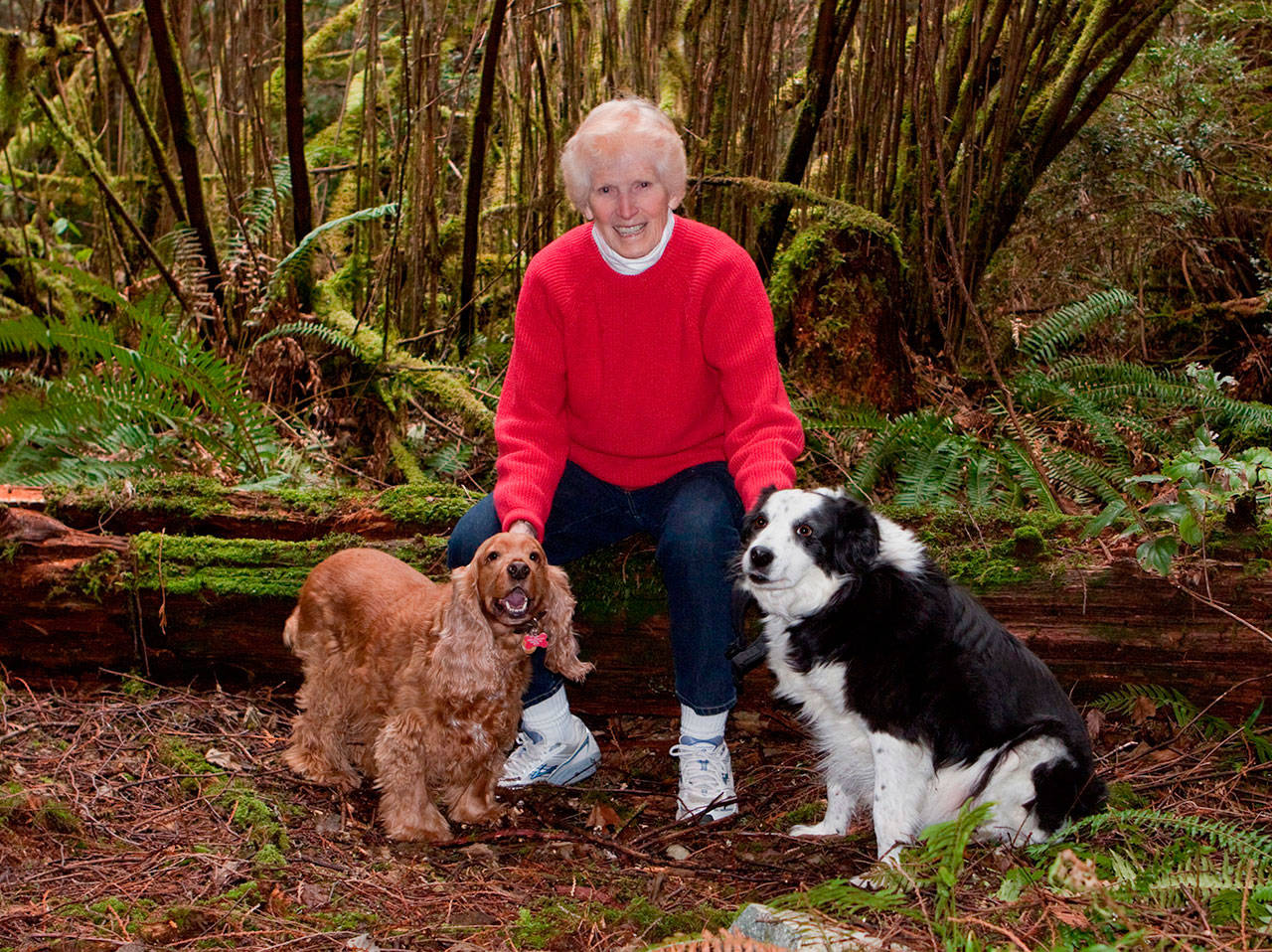If anyone complained about the amount of money it took to raise a dog or cat, Vashon-Maury Island resident Barbara Drinkwater would just say she never once got a complaint from either animal.
It’s a story that Geoff Fletcher, the president of Vashon Island Pet Protectors, an organization Drinkwater founded, tells to islanders often. But now, Fletcher and others are remembering Drinkwater — also a pioneering woman in sports medicine — who died Sept. 30, VIPP announced.
“She has been quite a leader for us,” Fletcher said. “The respect that she had in the community and her knowledge is just unsurpassed.”
A year after moving to the island in 1983, Drinkwater founded the nonprofit, no-kill animal rescue shelter that fosters dogs and cats until they can be matched up with island residents to take home.
In a 2014 interview with The Beachcomber, Drinkwater said she was particularly proud of the fact that VIPP had never euthanized a dog or cat.
“Once you make that statement, you have to follow through,” she said at the time. “It has been difficult at times, but we have managed to do it.”
Fletcher said Drinkwater got the idea to found the nonprofit when she saw people sitting outside the Thriftway grocery store giving away puppies and kittens.
“Barbara saw that happening and knew … it wasn’t real clear that the people who were getting them really knew what it meant to be adopting at that point,” he said. “So she and her partner, Piro Kramar, started the organization and began to take in some of these puppies and kittens.”
Drinkwater started fostering the animals in her home, teaching people about spaying and neutering them and “reviewing with them … what the obligation was in taking care of an animal,” according to Fletcher.
Kay Farris, a dog program co-manager at VIPP, told The Beachcomber she wrote Drinkwater a letter shortly before her passing but had not finished or sent it.
“‘I want you to know how important you have been in my life,” Farris wrote. “Working side by side with you, I have learned what real rescue is — that it is total and complete, taking each animal as the unique individual that he or she is, doing everything possible to make that individual whole — healing bodies, hearts and spirits. You taught me not only what rescue is and what it can be, but what it must be—unwavering and uncompromising.’”
Drinkwater’s partner, Piro Kramar, told The Beachcomber in an email that, “there is one thing that Barb was not — boring!”
“Over the last 40+ years, it has been my luck to enjoy the company of a human with a multifaceted personality, swathed in kindness towards all species, an unbending standard of justice, leavened by an impish sense of humor,” Kramar wrote. “Barb will never be forgotten.”
Drinkwater wasn’t just known for her work with pets. She was a Ph.D. researcher and professor at numerous institutions, including the University of Washington, primarily studying — and working with — female athletes.
In an interview with the American College of Sports Medicine, ACSM, a Drinkwater recalled reading a textbook years ago that said females were “over the hill” by age 15 when it came to physical activity and started to decline after that. Drinkwater called such studies an “error of judgment.”
“If you don’t measure what can happen, then you depend upon what you have,” she said in the ACSM interview. “These women had been discouraged from ever being active after age 15, so, naturally, there was no indication that they could do more.”
Drinkwater’s inspiration for doing her own research on females and sports medicine started by suspecting a lot of previous studies were wrong.
“When you look for flaws in the protocol and the method, you find them,” she said.
In the late 1970s, Drinkwater was involved in a conditioning program for several American women to prepare them for the climb up Annapurna, in the Himalayas in Nepal. The group became the first U.S. citizens to plant a flag on the summit of that mountain, 26,545 feet, according to an article published in The Physician and Sportsmedicine that was provided to The Beachcomber from VIPP. On that historic climb, however, two of the climbers died.
Drinkwater would later be elected as ACSM’s first female president and helped found Women Sport International, an organization with members from 30 countries promoting increased participation and support of women and girls in sports.
She would win awards, too, including the President’s Council on Fitness, Sports & Nutrition’s Lifetime Achievement award. Two years later, the ACSM held a symposium highlighting her life and work. Drinkwater did not attend due to health issues, organizers said at the time.
When it comes to assessing Drinkwater’s legacy, Fletcher said, it is difficult because it is multifaceted. But there is a general sentiment of compassion on Vashon-Maury Island that she left behind.
“Beyond the concrete organization and what the organization does, there’s a general spirit of caring and helping around animals that I think Barbara really helped to start that and foster that and make that grow,” Fletcher said. “This island does things that don’t happen in other places … to have this kind of caring and concern about animals and their welfare.”



